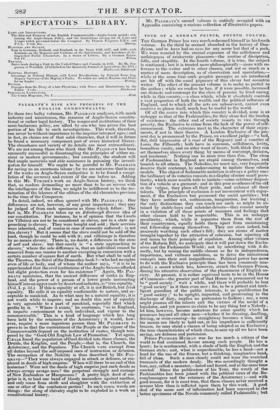PALGRAVE'S RISE AND PROGRESS OF THE ENGLISH COMMONWEALTH.
IN these two bulky volumes, Mr. PALGRAVE analyses, with much industry and minuteness, the remains of Anglo-Saxon constitu- tional or rather legal history. The usages and institutions of their semi-barbarous policy, are sifted by one who has given the best portion of his life to such investigations. This work, therefore, can never be without importance to the inquirer into past ages ; and in fact, its claims are of that solid character, that it will in future be found a necessary component part of every historical library. The abundance and variety of its details are most extraordinary. We are not among those who think that Mr. PALGRAVE has been eminently successful in disentangling the principles of either an- cient or modern governments ; but assuredly, the student will find ample materials and able assistance in pursuing the investi- gation for himself. We ought to be grateful to Mr. PALGRAVE for saving us an enormous labour ; for we are not aware that in any of the works on Anglo-Saxon antiquities is to be found a compi- lation of the accuracy and extent of the one before us. Adding to this Mr. TimstEa's work on Anglo-Saxon history, we think that, as readers demanding no more than to be an niveau with the intelligence of the time, we might be indifferent as to the ter- mination of the labours of the editors of the old chronicles previous to the time of the Conqueror. In detail, indeed, we often quarrel with Mr. PALGRAVE. Our differences are not, however, of any great importance : they may be judged of from such specimens as those which follow. The fact is, Mr. PALGRAVE takes up an Edinburgh Review idea of our constitution. For instance, he is of opinion that the Ceorls (or Villeins) are not to be considered as slaves, nor in a state ap- proaching to slavery. They were bought and sold ; their services were inherited, and of course in case of necessity enforced : is not this slavery? But it seems that the slave could not be sold off the land, though he could be sold with it; and villeinage is therefore by no means slavery. There is, no doubt, a difference in the state of serf and slave; but that surely is " a state approaching to slavery," where the sole difference is, that an individual cannot be removed from one master to another excepting in connexion with a certain number of square feet of earth. But what shall be said of the Theowes, the Servi of the Domesday-book ?—who had no rights even of life or body, and of whom the author says, " it is to be apprehended that the civil institutions of the Anglo-Saxons afforded but slight protection even for his existence ?" Again, Mr. PAL- GRAVE maintains, that the ancient difference of ranks in Eng- land, and the power of a person of a lower grade insinuating himself into an upper caste by desert and industry, is "true equality." (Vol. I. p. 33.) If this is equality at all, it is not British, but Irish equality. He calls it an equality conformable to nature, and ac- ceptable to mankind. As to what may be a natural equality, it is not worth while to inquire; and no doubt this sort of equality is very agreeable to a part of mankind, especially that which profits by it. " Where it exists," he continues, "as in England, it imparts contentment to each individual, and vigour to the -commonwealth." This is a kind of language which has long been held by the retainers of the Aristocracy ; it would, how- -ever, require a more ingenious person than Mr. PALGRAVE to prove to us that the contentment of the People or the vigour of the Commonwealth-depend on the institution of castes, though tem- pered by the "Good Old English Law of Promotion." Yet again, GES.AR found the population of Gaul divided into three classes, the Druids, the Knights, and the People,—that is, the Church, the Aristocracy, and the Populace. The Church were exempt from all duties beyond the self-imposed ones of instruction or delusion. The occupation of the Nobility is thus described by Mr. PAL- GRAVE—" They were always engaged in attack or defence, or em- ployed in deeds of high emprise." When will there be an end of this nonsense? Were not the deeds of high emprise just such deeds as always occupy savage men? the perpetual struggle and carnage of New Zealanders or Marquesans ? A pretty high deed of em- prise is it, to lead one band of bloody marauders against another, and only cease from strife and slaughter with the extinction of one or other of the combatant parties In such cases, words are things: the slang of chivalry ought to be exploded in a work on constitutional history. • Mr. PALGRAVE'S second volume is entirery occupied With an Appendix containing a curious collection of illustrative papers. •


























 Previous page
Previous page